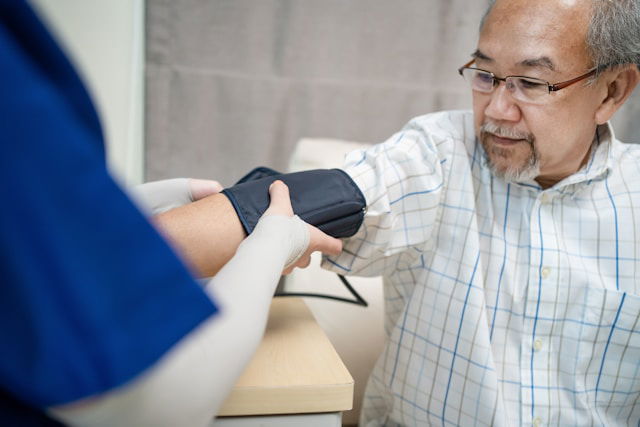
High blood pressure, also known as hypertension, happens when blood pushes too hard against the walls of your arteries for a long time.
It is measured with two numbers: the top number is called systolic pressure, and the bottom number is called diastolic pressure.
A normal reading is below 120/80 mmHg. Doctors usually say blood pressure is high when it stays above 130/80 mmHg. But the exact number that’s too high can change depending on your age and health.
Many things can lead to high blood pressure. These include having a family history of the condition, eating too much salty food, not exercising enough, feeling stressed, or having certain health problems. High blood pressure is called a “silent killer” because it often has no clear signs.
But it can cause serious problems like heart disease, stroke, and kidney damage. This is why it’s important to check your blood pressure often and make healthy lifestyle choices.
A new study has brought some good news for older people who have high blood pressure. The research looked at the best goal for systolic blood pressure (the top number) in adults aged 60 and over. The study was published in the journal Cardiovascular Innovations and Applications.
The scientists used a research method called Bayesian network meta-analysis. This method looks at data from many studies at once. They used results from six different trials. Each trial tested how different blood pressure levels affected people’s health.
The researchers divided people into three groups based on how low their systolic blood pressure was after treatment. One group had readings lower than 130 mmHg. The second group had readings between 130 and 139 mmHg. The third group had readings of 140 mmHg or higher.
The results showed that people in the group with systolic pressure below 130 mmHg had a much lower chance of having serious heart problems. These include things like heart attacks, strokes, and heart failure. Their risk was lower compared to people whose blood pressure stayed at 140 mmHg or above.
While lowering blood pressure aggressively might also lower the risk of dying from heart disease, the study found that the difference between groups was small. So, the results are helpful but not yet final. More studies are needed to be sure.
This research suggests that older people with high blood pressure should try to get their systolic pressure below 130 mmHg if possible. This may help protect their heart health.
There are many ways to manage blood pressure. You can check your blood pressure at home or at a clinic. Try to keep a healthy weight, eat more fruits and vegetables, and cut back on salty and fatty foods.
Regular exercise like walking or swimming helps too. It’s also important to avoid smoking and limit alcohol. Stress can also raise blood pressure, so try relaxing with deep breathing or meditation. If needed, take blood pressure medicine as your doctor advises.
Staying on top of your blood pressure can lower your risk of serious health problems. Researchers are also studying other ways to keep the heart healthy. Some studies suggest apple juice and yogurt may help the heart. On the other hand, black licorice may raise blood pressure dangerously, while some plant nutrients might help lower it.
The full study was done by Yuling Yan and others and published in Cardiovascular Innovations and Applications.
If you care about high blood pressure, please read studies about unhealthy habits that may increase high blood pressure risk, and drinking green tea could help lower blood pressure.
For more information about high blood pressure, please see recent studies about what to eat or to avoid for high blood pressure, and 12 foods that lower blood pressure.
Copyright © 2025 Knowridge Science Report. All rights reserved.



